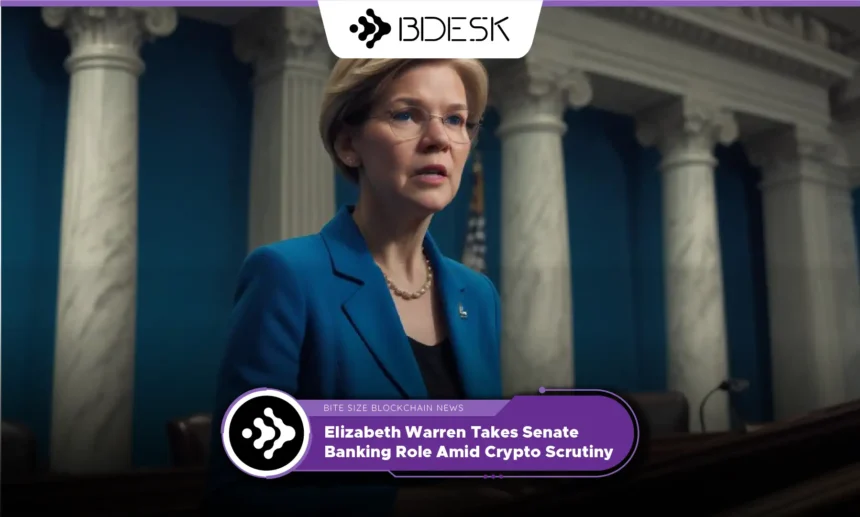Senator Warren replaces Sherrod Brown, signaling potential challenges and shifts in cryptocurrency regulation.
Warren Named Ranking Democrat on Banking Committee
Senator Elizabeth Warren has taken over as the ranking Democrat on the Senate Banking Committee, succeeding Sherrod Brown. Known for her skepticism toward blockchain and crypto, Warren’s appointment introduces new dynamics for the cryptocurrency sector and its regulatory future.
Brown’s Departure and Crypto’s Role in Politics
Sherrod Brown, a vocal crypto critic, ended his 17-year tenure in Congress following Bernie Moreno’s election victory in Ohio. Moreno, an advocate of blockchain, aligns with a wave of crypto-backed political figures gaining ground. Brown frequently spoke against cryptocurrencies, citing concerns about their use in financial crimes and advocating for stringent regulatory oversight.
Warren’s Stance on Cryptocurrency Regulation
On November 13, Warren confirmed her new role on the Senate Banking Committee. The committee influences regulatory bodies, such as the SEC, making her a key figure in potential crypto policy changes. Warren has introduced legislation aimed at enforcing traditional financial regulations, including Know Your Customer (KYC) rules, across digital asset platforms.
Industry’s Response to Warren’s Appointment
Crypto analysts have mixed reactions to Warren’s role on the committee. Although both Brown and Warren have historically criticized crypto, Warren’s influence, now as ranking Democrat, could drive legislative changes. Paul Grewal, Coinbase’s CLO, noted that while her stance poses challenges, it may bring necessary regulatory clarity.
Potential Impact on Miners and Wallet Providers
Some of Warren’s past proposals call for miners, validators, and wallet developers to adhere to KYC standards, challenging the crypto industry’s privacy-focused ethos. Her initiatives have faced criticism from industry players who argue these measures could expose users to privacy risks.
Positive Momentum for Crypto Regulation
Despite Warren’s influence, many in the industry see signs of progress. Rebecca Rettig, Polygon’s chief legal officer, mentioned that recent elections indicate a possible shift toward regulatory clarity. According to Rettig, the sector could witness more defined policies, potentially leading to collaborative efforts between regulators and the crypto industry.
Stablecoins in the Regulatory Spotlight
Rettig hinted that stablecoins may be the first crypto assets to face formal regulation, possibly by 2025. Stablecoin legislation could help the U.S. strengthen its presence in the global financial market. This aligns with views from Bitwise’s Matt Hougan, who highlighted stablecoin regulations as impactful for the market’s growth and stability.
Outlook: Opportunities and Obstacles
While Warren’s appointment as ranking Democrat might signal increased scrutiny, it also suggests an evolving regulatory landscape. As Congress and industry players push for clearer policies, the coming years may define the role of digital assets in mainstream finance.
Disclaimer:
The information provided on 13Desk is for informational purposes only and should not be considered financial advice. We strongly recommend conducting your own research and consulting with a qualified financial advisor before making any investment decisions. Investing in cryptocurrencies carries risks, and you should only invest what you can afford to lose. 13Desk is not responsible for any financial losses incurred from your investment activities.











